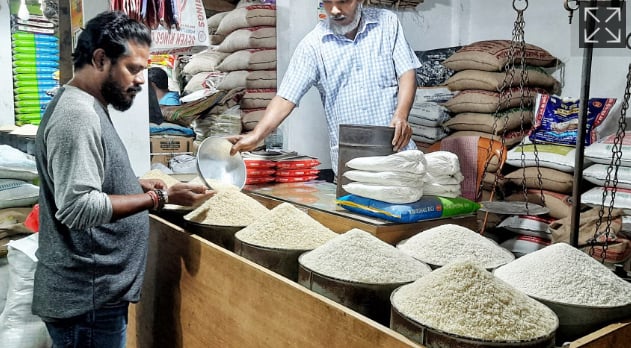November 24, 2025 | 05:36 GMT +7
November 24, 2025 | 05:36 GMT +7
Hotline: 0913.378.918
November 24, 2025 | 05:36 GMT +7
Hotline: 0913.378.918

Rice prices are unlikely to decline from the current level in marketing year (MY) 2024-25, beginning from May, the US Department of Agriculture (USDA) said in its latest report on Bangladesh.
The Economic Research Service (ERS) of the US Department of Agriculture said in its Rice Outlook Report on April 15 that “over the past month, quotes for trading prices for most grades of regular (neither parboiled nor aromatic) whole grain milled rice from Thailand decreased 6% to 7%, mostly due to the weakening of the Thai baht and the beginning of the dry-season crop entering the export market.”
“For the week ending April 9, Thailand’s 100% Grade B long-grain milled rice for export was quoted at $590 per tonne, down $43 from the week ending March 5 and the lowest since mid-November,” the ERS added, but noted that “despite the recent declines, Thailand’s rice trading prices continue to be supported by India’s export bans and restrictions.”
Price quotes for 5% brokens from Vietnam for the week ended April 9 also declined, dropping $10 per tonne from the month ended March 5 to $585 per tonne, with the harvest of its winter-spring crop well advanced, the ERS said.
“The fully irrigated winter-spring crop is Vietnam’s largest rice crop and accounts for the bulk of its rice exports,” the ERS said.
Prices for rice from Pakistan fell, as a bumper crop has more than offset record global demand, the ERS said. With harvests well underway, prices in Argentina, Brazil, Paraguay and Uruguay declined over the previous month.
The United Nations Food and Agriculture Organization (FAO) reported in its Rice Price Update of April 4 that overall world rice prices were 1.7% lower in March 2024 than in February 2024. Prices were at an eight-month low, but still 14% higher than in March 2023, largely due to persistently strong Indica prices, the Rome, Italy-based FAO said.
Despite a 1.6% monthly fall in March, Indica quotations remained 22.9% above their level in March 2023, the FAO said.
“Prices in other market segments have been less bullish, as has been the case of Glutinous prices, or have seen fairly consistent falls over the past seven months that have placed them below year-earlier values,” the FAO said. “This has been most notably the case of Japonica values, which following a 5% monthly fall in March stood 28.3% below their year-earlier level and at their lowest since September 2021.”
The market undertone remained soft in Asia during March, as although Indonesia remained in the market for supplies, demand proved otherwise insufficient to offset supply-side pressure, the FAO reported.
“This was most evident in Vietnam, where quotations slipped 5% below February levels as the winter-spring harvest peaked and the dong eased vis-à-vis the US dollar,” the FAO said.
“In the absence of substantial orders, imminent or ongoing offseason harvests also weighed on sentiment in Thailand and India, as did price trends in other origins in Pakistan,” the FAO said. “In India, the mild fall in parboiled values that was registered was notwithstanding emerging questions surrounding the calculation of the 20% export tax levied on parboiled rice since August 2023, which would have reportedly led some traders to adjust prices upward to protect their margins.”
In its April 12 Rice Advocate publication, the US Rice Producers Association said that “with harvest in Argentina over 65% complete, Uruguay more than halfway, Paraguay nearly complete, and heavyweight Brazil closing in on completion, US long grain is officially more expensive than these southern counterparts. Despite this, the market is still firm and looks positive.”
(WG)

(VAN) In Brazil, FAO unveiled a series of reports and initiatives showing how sustainable agrifood systems are a solution to the climate crisis.

(VAN) With names like neodymium and dysprosium, rare-earth elements sound exotic — and their perceived scarcity has only added to the mystique.

(VAN) In a new study published in Trends in Biotechnology, researchers used a gene-editing technology called CRISPR to increase a fungus's production efficiency and cut its production-related environmental impact by as much as 61%- all without adding any foreign DNA.

(VAN) A top official in Beijing’s Cop delegation says China is committed to clean energy – but US’s absence is a problem.

(VAN) The Bangsamoro region’s inflation rate rose slightly to –1.3 percent in October 2025 from –1.5 percent in September, the Philippine Statistics Authority (PSA-BARMM) reported.

(VAN) FAO-led report says protecting and restoring forests is crucial to boosting climate-resilient agriculture, rural livelihoods and global food and water security.

(VAN) Flagship partnership secures additional GBP 16.9 million to strengthen forest monitoring, transparency and country support to 2030.